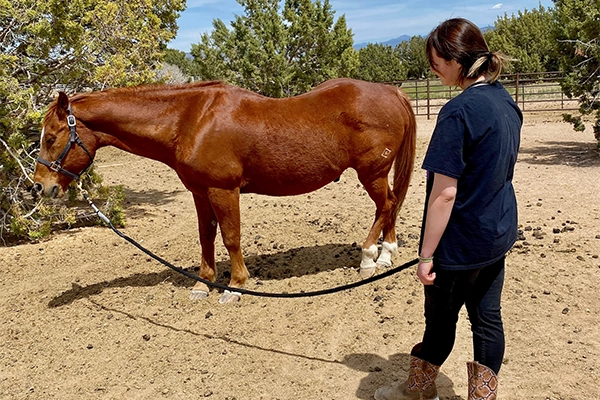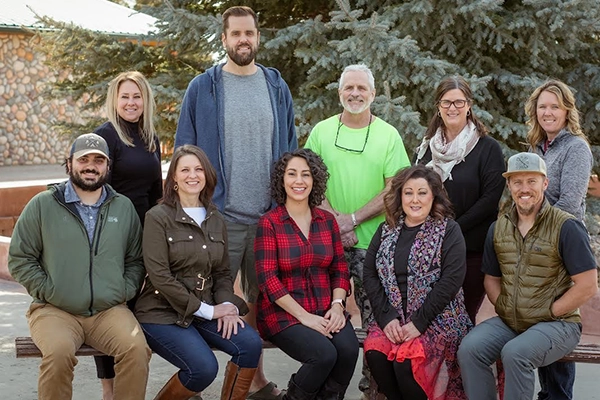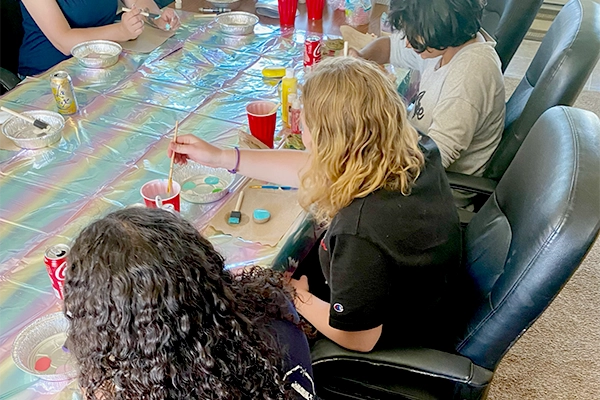Top DBT Residential Treatment Center for Teens in Crisis
It is absolutely devastating for any parent to witness their teenager experience a crisis. Whether it’s mental health issues like trauma, anxiety, or depression, behavioral challenges, substance abuse, or a combination of these, finding the right treatment solution is essential. One evidence-based option gaining recognition for its effectiveness is Dialectical Behavior Therapy (DBT). In a DBT Residential Treatment Center, teens receive intensive, tailored therapy within a supportive and structured environment. This article offers essential insights for parents seeking this treatment approach.
In our residential DBT program, teens receive help through:
- individual DBT therapy
- a therapist consultation team
- and DBT therapy groups
Individual DBT Therapy
The first key component of DBT is individual therapy. Therapists will often have their patients use diary cards, which are specially formatted cards used to track when their target symptoms occurred and the skills they used to cope with it. During individual therapy, the therapist and patient discuss the problems that came up.
The therapists will follow a treatment target hierarchy when addressing the patient's issues.
- Life-threatening behaviors take first priority.
- Behaviors that, while not directly harmful to self or others, interfere with the course of treatment, take second priority.
- Quality of life issues take third priority.
As the patient and therapist discuss these problems, the therapist teaches the patient problem-solving behaviors to help them deal with them in the future.


Therapist Consultation Team
The DBT consultation team includes individual therapists, group therapy leaders, case managers, and others who help with the patient. The purpose of the consultation team is to help therapists stay motivated and competent so they can provide the best mental health treatment possible.
DBT Therapy Groups:
In a DBT skills group, teens learn essential coping skills. This skills training is broken down into four modules that are foundational to our DBT therapy groups:
- mindfulness
- distress tolerance
- emotion regulation
- and interpersonal effectiveness

In addition to comprehensive individual therapy, a dedicated therapist consultation team, and engaging group therapy, our dialectical behavior therapy program focuses on teaching teens essential DBT skills that empower them to navigate even the most difficult situations with resilience and confidence.
Enhance Your Treatment with RO DBT
In Addition to Being a Residential DBT Program, Discovery Ranch South Also Offers Radically Open Dialectical Behavior Therapy (RO DBT).
What are DBT Skills?
DBT skills are a set of evidence-based techniques and strategies that help individuals develop coping skills and regulate emotions. They are designed to assist individuals in managing distress, improving relationships, and increasing their emotional well-being. DBT skills are based on the principles of:
Now, let's delve into each of the DBT skills in greater detail to understand how they can be applied in addressing emotional dysregulation, self-destructive behaviors, and interpersonal challenges.
DBT Skill #1: Mindfulness
The first foundational skill taught in DBT is mindfulness. Mindfulness is the process of bringing one’s attention to the current moment. It is about paying attention to what is happening in the moment without judgment, overthinking, or invalidating the experience. Mindfulness is a major tool in DBT because it helps people accept and cope with the powerful emotions felt when challenging their habits or exposing themselves to upsetting situations.
Mindfulness and the meditative exercises used to teach it came from traditional Buddhist practice, though the version taught in DBT does not involve any religious or metaphysical concepts. DBT is about living in the moment and experiencing one’s emotions and senses fully, and with perspective. Mindfulness makes people more aware of their environments through their five senses of touch, smell, sight, taste, and sound.
To understand mindfulness, it is important to understand the DBT mindfulness skills of "Wise Mind", “What”, and“How”
“Wise Mind"
In the journey towards healing and growth, our emotions and thoughts often take center stage. At Discovery Ranch South, we empower girls and teens to find equilibrium through the powerful DBT skill known as "Wise Mind."
Wise Mind is the delicate intersection of two vital aspects of our being: our rational or logic mind and our emotional mind. It's the place where logic meets intuition, enabling teens to make sound decisions while acknowledging and validating their feelings. Through guidance and support, we help our residents cultivate this harmonious state of mind.
“What” Skills
“What” skills of DBT are what you do to be mindful. The main “What” skills are:
- observe
- describe
- and participate
People nonjudgmentally observe their environment within or outside themselves. They then describe, without judgmental statements, to express what they have observed. The third “What” skill is: participate, which people use to become fully focused and involved in the activity that they are doing.
“How” Skills
"How” skills are how you do the “What” skills. These skills are done
- nonjudgmentally
- one-mindfully
- and effectively
To be nonjudgmental, you describe the facts without considering the facts in terms of good, bad, fair, or unfair, because these terms are judgments and not factual descriptions.
Being nonjudgmental helps you get your point across. You are mindful by focusing on one thing. This helps you appreciate the moment. You are then effective by doing simply what works. It is a very broad-ranged skill and can be applied to any other skill.
In the nurturing environment of Discovery Ranch South, our residents learn to use their "What" and "How" skills and to access their Wise Mind. These skills not only aid in managing difficult emotions but also foster self-awareness and mindful decision-making. As girls and teens traverse the path to healing, the Wise Mind technique becomes a compass, steering them towards balance, resilience, and a brighter future.
DBT Skill #2: Emotional Regulation
The second foundational skill taught in Dialectical Behavior Therapy (DBT) is emotion regulation. Emotion regulation helps patients manage negative and overwhelming emotions while increasing their positive experiences. Patients learn that negative emotions are not bad and do not need to be avoided. Instead, they learn that negative emotions are a normal part of life. Patients learn to acknowledge and then let go of negative emotions so that their feelings do not control their behaviors.
The emotional regulation skill consists of the parts or subskills:
ABC PLEASE
“ABC PLEASE” is an acronym that sets guidelines on how patients should take care of their physical health since our physical health is closely tied to our mental health. You know how when we're on an airplane, they say to put on your own oxygen mask before helping others? Well, that's what this is about – taking care of ourselves so we can be strong for others. When we are sick, exhausted, or otherwise unhealthy, we are more likely to experience negative emotions. When we take care of our bodies, we are more likely to have positive emotions and can be more present and engaged in our relationships and life. "ABC PLEASE" stands for:
- Accumulate positive emotions - This is all about doing stuff that makes us happy, like watching a funny movie or hanging out with friends. When we do things we like, it's like adding drops of happiness to our day.
- Building mastery - Doing things we enjoy, like reading, cooking, or fixing stuff, helps us build self-confidence and feel good about ourselves.
- Cope ahead - We imagine what might happen and make a plan to handle it. Ever heard of practicing before a big game? That's what this is like, but for life challenges.
- PhysicaL illness: If you are sick or injured, get proper treatment.
- Eating: Eat a healthy, balanced diet.
- Avoid mood-altering drugs: Do not take non-prescribed medication or drugs. They can be harmful to your body and can make your mood unpredictable.
- Sleep: Do not sleep too much or too little. Teenagers should get 8-10 hours of sleep each night.
- Exercise: Regular exercise will make you healthier and happier. Exercise will improve your body image, release endorphins, and help you be more active overall.
Practicing ABC PLEASE is like wearing mental armor that protects us from getting too sick or overwhelmed. When we take care of ourselves, we're less likely to get hurt by tough situations or feel really down.
Opposite Action and Problem Solving
Opposite action is used when patients have an unjustified emotion, which is an emotion that doesn’t belong in the current situation. Patients use opposite action by doing the opposite of what their urges tell them to do at the moment. It is a tool that brings them out of an unwanted or unjustified emotion by replacing it with an emotion that is opposite and justified. When their negative emotion is justified, patients learn to use problem-solving.
Opposite action steps include:
- Identifying and describing emotions
- Identify the urge associated with each emotion
- Ask, "Does the urge fit the facts? Is it effective in this situation?"
- Decide if you want to change the emotion
- If so, do the opposite in thoughts, actions, etc
- Repeat these opposite actions until you notice a change in emotion
Ride the Wave
Specific emotions don’t last, they come and go like waves in the ocean. Positive emotions peak and fade back into a sense of normalcy. Similarly, negative emotions also have a peak and then eventually decrease back to a normal baseline. Problems arise when we get stuck in either believing that a negative emotion will last forever or trying to control life in an attempt to preserve a positive emotion forever.
The key to "riding the wave" of emotions is to believe two things:
- This is not the last time you’ll ever have this positive emotion
- That the negative emotion will indeed pass
DBT Skill #3: Distress Tolerance
The third foundational skill taught in Dialectical Behavior Therapy (DBT) is distress tolerance. Distress tolerance increases a patient’s tolerance of negative emotions. The goal is to be able to calmly recognize negative situations and their impact, rather than becoming overwhelmed or hiding from them. This allows patients to make wise decisions about how to take action, rather than falling into intense and often destructive emotional reactions. There are two acronyms used to help patients use distress tolerance:
Distract with ACCEPTS
Patients use the acronym “ACCEPTS” to distract themselves temporarily from unpleasant emotions.
- Activities: Do an activity or hobby that you enjoy.
- Contribute: Serve the people around you or contribute to service in your community.
- Comparisons: Compare yourself either to people that are less fortunate or to how you used to be when you were in a worse state.
- Emotions: Cause yourself to feel something different by provoking your sense of humor or happiness with corresponding activities.
- Push away: Put your situation on the back burner for a while. Put something else temporarily first in your mind.
- Thoughts: Force your mind to think about something else.
- Sensations: Do something that has an intense feeling other than what you are feeling, like taking a cold shower or eating spicy food.
IMPROVE the Moment
Patients use the acronym “IMPROVE” to help them relax in stressful situations.
- Imagery: Imagine relaxing scenes, things going well, or other things that please you.
- Meaning: Find some purpose or meaning in what you are feeling.
- Prayer: Either pray to whomever you worship or, if not religious, chant a personal mantra.
- Relaxation: Relax your muscles and breathe deeply.
- One thing in the moment: Focus your entire attention on what you are doing right now. Keep yourself in the present.
- Vacation: Take a break from it all for a short period of time.
- Encouragement: Cheer yourself on. Tell yourself that you can make it through this.
TIPP: Changing Body Chemistry
Patients use the acronym “TIPP” to change the body's physiological responses that accompany moments of distress. TIPP stands for:
- Temperature - Decrease the temperature of your body to calm yourself down fast. You can do this by holding an ice cube, taking a cold shower, or even using an ice bath.
- Intense exercise - Engaging in vigorous physical activity can effectively process the intense emotions that often come with the fight-flight-freeze response. This helps your body transition back to a relaxed state of rest and digestion.
- Paced breathing - Gradually slow your breath down. Breathe out even slower. You can choose your own counts, like inhaling for 5 and exhaling for 7. Slowing your breath also slows your pulse and brings calm.
- Paired muscle relaxation - progressively tighten and then relax each muscle in your body. Observe the shift in how your body feels after releasing muscle tension.
Pros & Cons List
When faced with a distressing situation, you can create a Pros and Cons list to decide if you should act on an impulse or tolerate an impulse. The exercise helps you move out of the emotional mind and uses more of your reasoning mind. To do this you:
- Describe the urge, impulse, or crisis behavior you are trying to avoid.
- Examine the pros and cons of both acting on the impulse and the pros and cons of tolerating the impulse.
- When listing the pros and cons of each behavior, look at the immediate and longer-term consequences of each option.
Self-Sooth With the Five Senses
Self-soothe skills involve physical methods that engage your senses. Use them when you're upset, emotions are intense, or situations seem unbearable. Reduce the intensity of negative emotions by using your body's senses:
- Vision - go for a walk in nature, go to a museum or your favorite place, or look at a photo album
- Hearing - listen to your favorite music or focus on isolating specific sounds around you
- Smell - use your favorite scented lotion, smell a favorite meal, or smell a flower
- Taste - eat a favorite food or eat mindfully and try to isolate specific flavors or textures in your food
- Touch - take a shower, pet a dog, or wear tactile and comfortable clothing
- Movement - move mindfully paying attention to sensations within your body, stretch, or exercise
Radical Acceptance
While you might not alter the stress around you, you can change how you feel about and respond to a situation. Radical Acceptance involves embracing your situation without judgment, aiming to let go of resistance. It's about ceasing to battle reality.
Radical Acceptance involves asking:
- What is the painful situation?
- What are my choices?
- What are the consequences of each choice?
- What is the best choice?
- Then accepting it as the best choice and acting on it.
Radical Openness is an alternative to Radical Acceptance and is better suited for teens struggling with overcontrolling behaviors. Learn more about Radical Openness.
DBT Skill #4: Interpersonal Effectiveness
The fourth foundational skill taught in Dialectical Behavior Therapy (DBT) is interpersonal effectiveness. Interpersonal effectiveness teaches patients how to communicate with others in a way that is assertive, maintains self-respect, and strengthens relationships. There are three acronyms that patients use to understand and apply interpersonal effectiveness:
DEAR MAN
Patients use the acronym “DEAR MAN” to convey their needs to another person.
- Describe your situation using specific factual statements.
- Express your emotions experienced when the situation occurred, why this is an issue, and how you feel about it.
- Assert yourself by asking clearly and specifically what you want.
- Reinforce your position by offering a positive consequence if you were to get what you want.
- Mindful of the situation by keeping your focus on your objective, maintaining your position, and not getting distracted.
- Appear confident and assertive, even if you don’t feel confident.
- Negotiate and come to a comfortable compromise.
FAST
The acronym “FAST” helps patients maintain self-respect.
- Fair: Be fair to both yourself and the other person.
- Apologies (few): Don’t apologize more than once for what you have done ineffectively.
- Stick to Your Values: Stay true to what you believe in and stand by it. Don’t allow others to encourage you to act against your own values.
- Truthful: Don’t lie. Lying can only pile up and damage relationships and your self-respect
GIVE
The acronym “GIVE” helps patients maintain relationships in conversations, whether they are with friends, coworkers, family, romantic partners, etc.
- Gentle: Use appropriate language, no verbal or physical attacks, no put-downs, avoid sarcasm unless you are sure the person is alright with it, and be courteous and non-judgmental.
- Interested: When the person you are speaking with is talking about something, act interested in what they are saying. Maintain eye contact, ask questions, etc. Avoid using your cell phone during an in-person conversation.
- Validate: Show understanding and sympathy of a person’s situation. Validation can be shown through words, body language, and facial expressions.
- Easy Manner: Be calm and comfortable during the conversation. Use humor and smile.
Walking the Middle Path
The "Walking the Middle Path" skill is used to move away from "either-or" thinking and develop a "both-and" way of thinking. This involves both Validation of Others and Validation of Self.
Validation of Others means to:
- Validate others' feelings, thoughts, and behaviors
- Actively listen
- Pay attention to verbal and non-verbal reactions
- Observe the other person's feelings in the moment
- Reflect the feeling back without judgment
- Show tolerance as you look for truth and what makes sense
- Respond to show you are taking this seriously
Validation of Self means to:
- Listen to your own thoughts, feelings, and behaviors
- Describe your own feelings without judgment
- Respond by accepting that it is OK to have your own emotions
- Acknowledge that the emotion make sense
- Be non-judgemental of yourself and your emotion
- Use FAST and other Interpersonal Effectiveness skills to maintain self-respect
Quality Care for Your Teen: Choosing Discovery Ranch South for Your Residential DBT Program
As a parent, we understand how challenging it can be to see your teenager struggle emotionally. That's why our DBT treatment program at Discovery Ranch South is dedicated to providing comprehensive and compassionate care for your child. With our individual therapy, therapist consultation team, and group therapy, alongside the essential DBT skills we teach, we empower teens to thrive even in the most challenging situations.
Our mission is to support your teenager in their journey towards healing and growth, providing them with the tools they need to navigate life's challenges with resilience and confidence. We are committed to partnering with you as parents, working together to create a brighter future for your teenager. You can trust that your child will receive the highest level of care and support at Discovery Ranch South. Contact us today to learn more about how our comprehensive DBT Residential Treatment Center can help your teenager on their path to wellness.

Additional Resources
About the Author: Rashell Stubbs, LCMHC

Rashell has been with Discovery Ranch South since 2017 and became Assistant Clinical Director in 2021. Prior to joining the Discovery Ranch South team Rashell worked with adolescents since 2005 as a residential staff and therapist. Rashell graduated from the University of Phoenix with a Master’s Degree in Mental Health Counseling in 2008. She has worked primarily with adolescents during her career.
She has experience working with youth who experience depression, anxiety, attachment challenges, trauma, and those with Autism. Rashell is a DBT therapist who has completed the Level 1 Intensive Training for Radically Open DBT, and Phase 1 of Brainspotting. Rashell currently leads the RO DBT group and a Horsemanship Group.
Rashell loves working at Discovery Ranch South. She loves to see the healing of the students and families. She is grateful and appreciates the opportunity to be a part of this process in the lives of students. Rashell’s background includes riding horses and raising livestock. Naturally one of her favorite things about Discovery Ranch South is the calf and equine program.
Rashell is married, has three daughters and a dog, Posh, who comes to work with her each day. Outside of life at Discovery Ranch South, you will find Rashell spending time with her family at their cabin, on the lake, golfing or hiking in the many places that Southern Utah has to offer.
